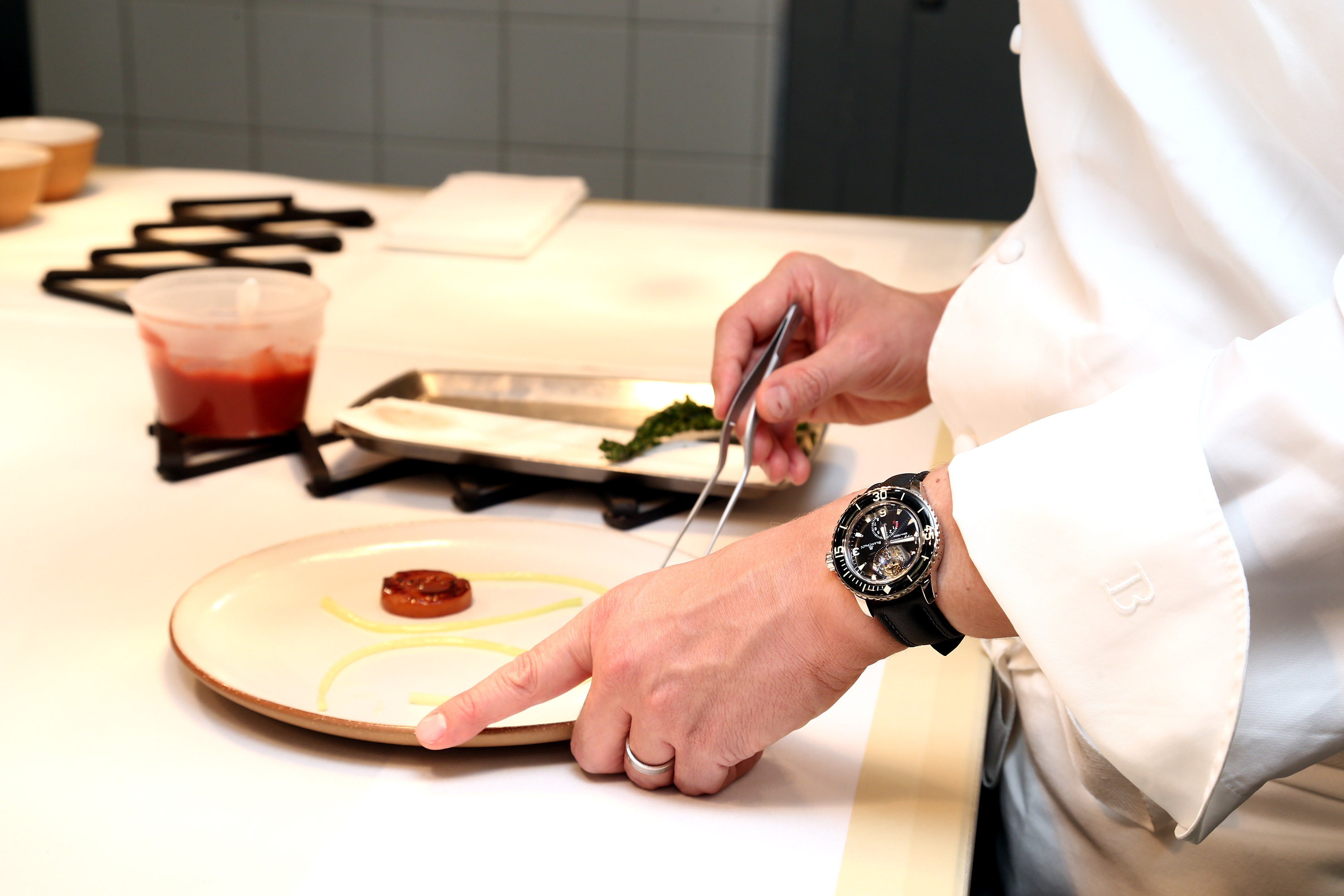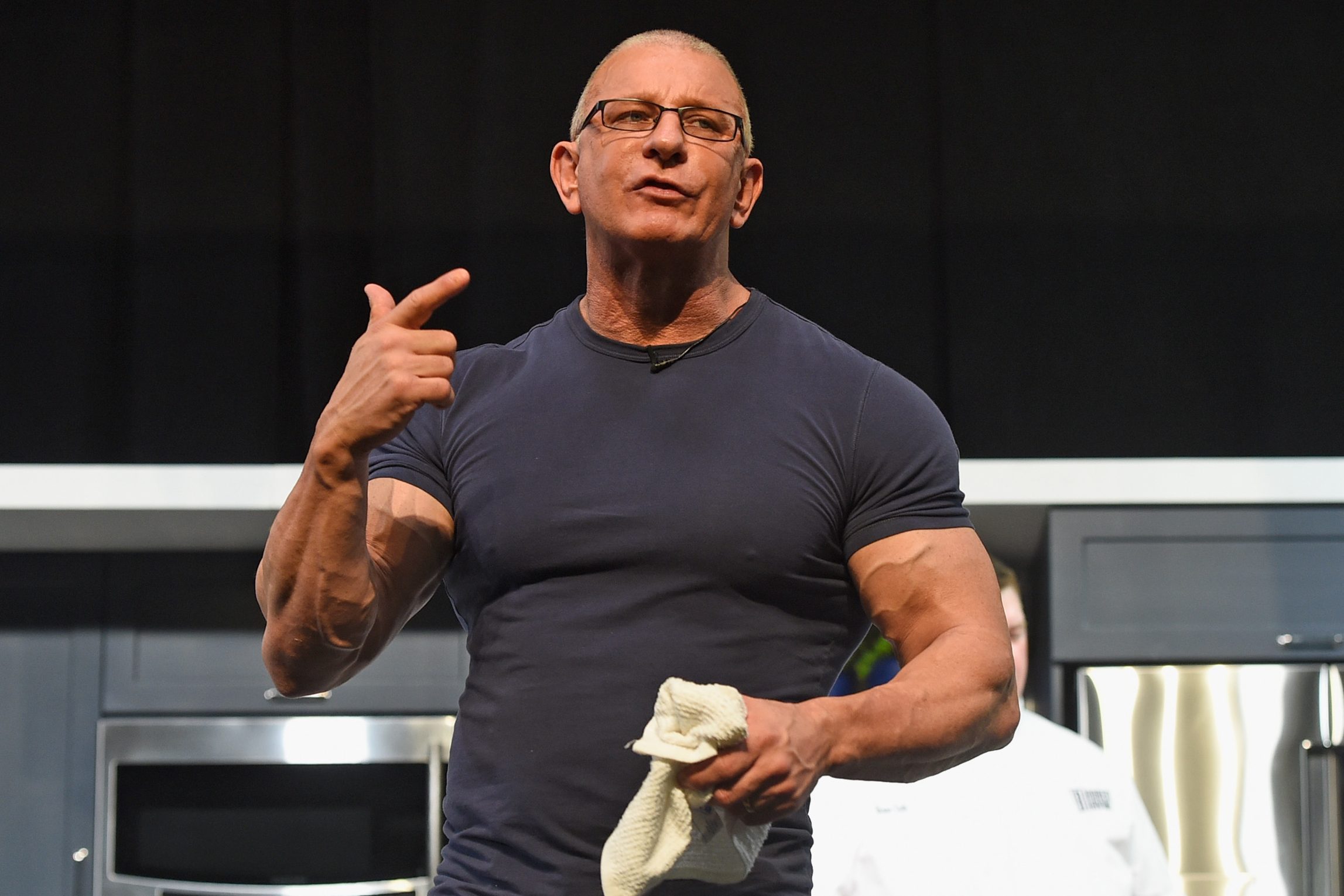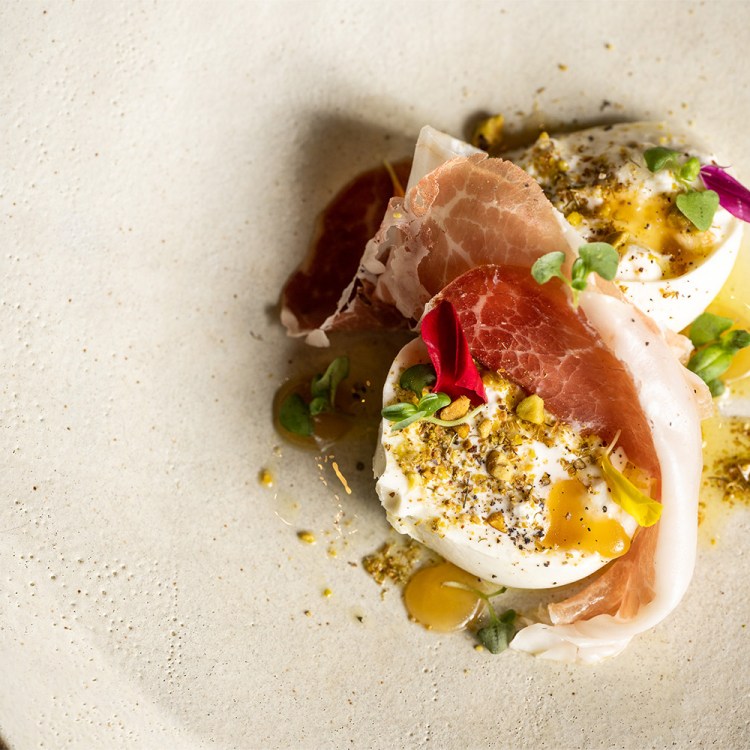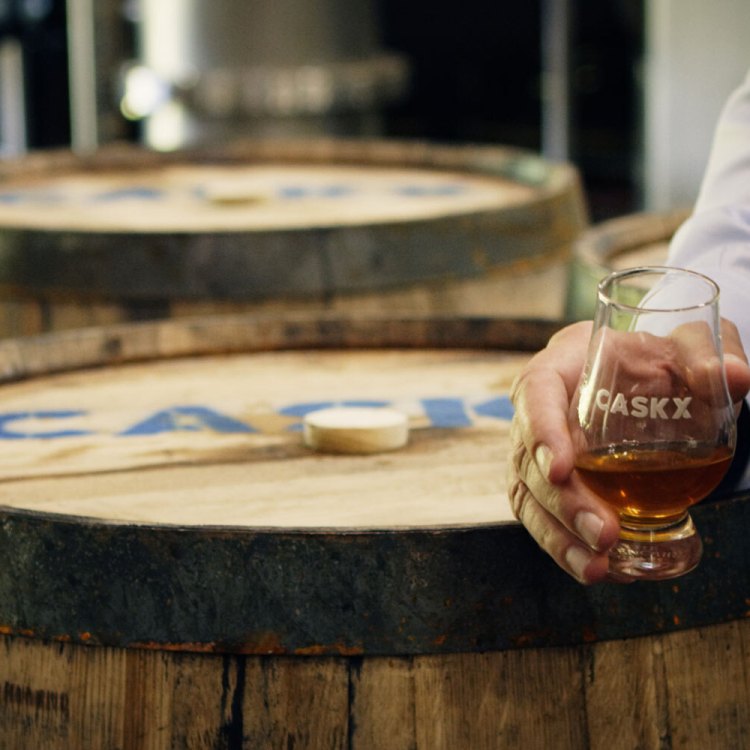There are some people who will tell you that Sqirl, the Instagram-friendly Los Angeles brunch spot known for its tasty grain bowls, avocado toast and perhaps most famously, its ricotta jam toast, is the most popular restaurant on both coasts. New Yorkers who usually go out of their way to not act like tourists when they travel make it one of the first stops when they’re in town just to try the signature dish: a thick, toasted slice of brioche, topped with a generous amount of ricotta and the restaurant’s house-made jam.
But over the weekend, that jam — which is also the subject of a new cookbook from owner/chef Jessica Koslow, The Sqirl Jam Book (Jelly, Fruit Butter and Others), due out July 21 — went viral for all the wrong reasons. Joe Rosenthal, a Minnesota-based mathematician and food blogger who describes himself as a “food antagonist,” compiled a series of allegations and firsthand accounts from more than a dozen former Sqirl employees and shared them to his Instagram account. (Rosenthal did not respond to InsideHook’s request for comment.)
The claims included everything from an unsafe, unsanitary kitchen space that was kept hidden from health inspectors to vermin, but the one that seemed to disturb people the most was the assertion that the company’s famous jam was not stored correctly, causing it to grow mold, and that employees were regularly instructed to scrape off the mold and serve the jam to customers. “We’re talking about some buckets having like 1⁄4 inch of mold covering the entire tops of gallon buckets,” one of Rosenthal’s Instagram posts alleged.
On Sunday, Sqirl released a statement about the moldy jam allegations (which you can read in full below), which explained that because it doesn’t use commercial pectin, stabilizers or much sugar, its jam is “more susceptible to the growth of mold.” The statement included an admission that mold was occasionally scraped off of batches of jam that was later served to customers, but insisted it was done “with the guidance of preservation mentors and experts like Dr. Patrick Hickey, by discarding mold and several inches below the mold.”
As for some of Rosenthal’s other allegations (which InsideHook was not able to independently verify beyond Rosenthal’s account), Koslow vehemently denies that her kitchen ever had a rodent infestation. (“Sqirl does not now, nor has it ever, had a rat problem,” she says.) But Elise Fields, a baker at Sqirl from 2018 to 2019, recently backed Rosenthal’s claim that employees were locked inside the kitchen during a health inspection, according to the Los Angeles Times.
“The majority of my time there was spent working out of that kitchen, which was cramped, infested, unsafe and had zero ventilation,” Fields told the publication. “During a surprise health inspection myself and another cook once had to hide and lock ourselves inside for the duration of the inspection which took over an hour to complete … The entire prep area, dry storage, walk-in, storage areas and basically every aspect of the non-cafe area were horrendous and unorganized and easily the least hospitable environment I’ve ever worked in.”
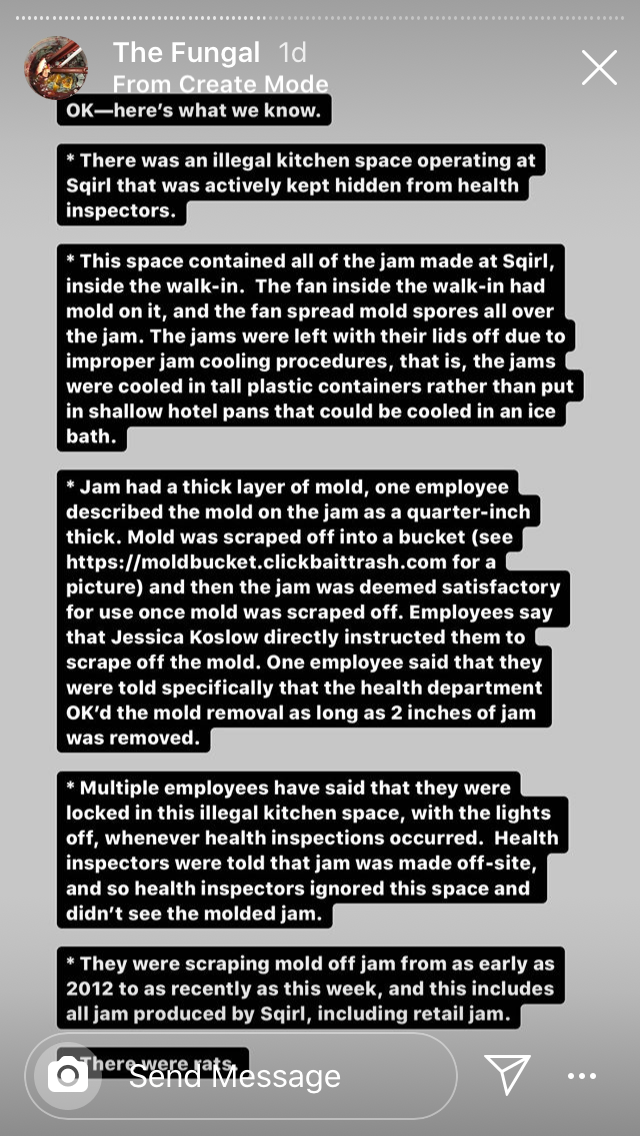
In a statement shared with InsideHook on Tuesday, Koslow elaborated on the mold situation and addressed the claim that she was hiding a kitchen space from health inspectors.
“To my customers and my employees, I want to start by saying that I am sorry,” she said. “Sqirl was built with a vision in my mind and the little money I had saved. We started with boxes as tables and crates for chairs. Like any business, as we started to grow, we needed more space, so in 2013, I acquired a secondary kitchen in the space that is now Sqirl Away (directly next door to Sqirl) and it was permitted to operate as a kitchen. I filed paperwork and proactively contacted the Health Department to request an inspection in 2013.”
She goes on to say:
“The truth is that at the time I thought I could update the additional space with the little funds I had saved. But the job ended up being bigger than I could afford and my bank would not give me a loan. Around that time, our secondary kitchen fell off the radar of the Health Department, despite the fact that Sqirl’s main kitchen received regular inspections. Ashamedly, I took advantage of their oversight and did the best we could as we used Sqirl’s main kitchen for all our restaurant orders including jam, and used the secondary kitchen primarily for baking and food prep. We were at risk of being shut down, but in our industry, this is common and I was just focused on keeping the lights on and keeping my team employed.”
Koslow says no jam was ever made in the secondary kitchen, only stored there, and she notes that the health department has known about the kitchen space since 2018 and “worked constructively with us as we modernized” it, giving it an A rating along with the main Sqirl kitchen and its catering kitchen.
“I take the safety and health of my staff and customers seriously,” she continues. “All of the retail jam we have ever sold — which is to say the jam in jars that is bought from us and at stores — is pasteurized and canned with the ‘hot pack’ method that makes the growth of mold basically impossible. That same recipe is used in the restaurant, but because the jam is low in sugar and we don’t use chemicals or preservatives there were occasional instances where mold would develop on the surface…I eat the same jam I serve my customers, family and friends and would never knowingly serve any food that would put their health at risk. I realize that I was wrong and I am sorry.”
She says any jam with mold on it has already been thrown out and moving forward, if mold develops on any jam, it will be immediately discarded. “Jam with mold will not be permitted in any of our kitchens or our restaurant,” she says. “We are implementing the same ‘hot pack’ method which is a commercial industry standard that involves pasteurizing all the jam used in the restaurant and storing it in smaller glass containers — just like we always have done with our retail products. We are also submitting samples of our jam to an independent lab, Certified Laboratories, Inc., for testing to ensure its safety and longevity.”
“I know I have lost the trust of our loyal customers, partners, and jam subscribers and hope that my sincere regret and these changes demonstrate that I have learned from my mistake and are enough to earn a second chance from them,” she added.
In addition to the mold, the allegations against Koslow by Rosenthal and several former employees included claims that BIPOC chefs at Sqirl were not properly credited for their contributions to the restaurant’s recipes or cookbooks, while Koslow was nominated for a James Beard award. Javier Ramos, former chef de cuisine at Sqirl, called her “the Trump of the cooking world” in an Instagram post.
“She also took credit for my 2 1/2 years as chef at Sqirl,” he wrote. “Didn’t get recognition or payment for the recipes that I contributed to the cookbook, took a James Beard nomination in my name when [she] can’t even cook at a domestic level, let alone professional level. Fired me for wanting to be properly compensated & lied to prominent people in the food industry as to why I was let go.”
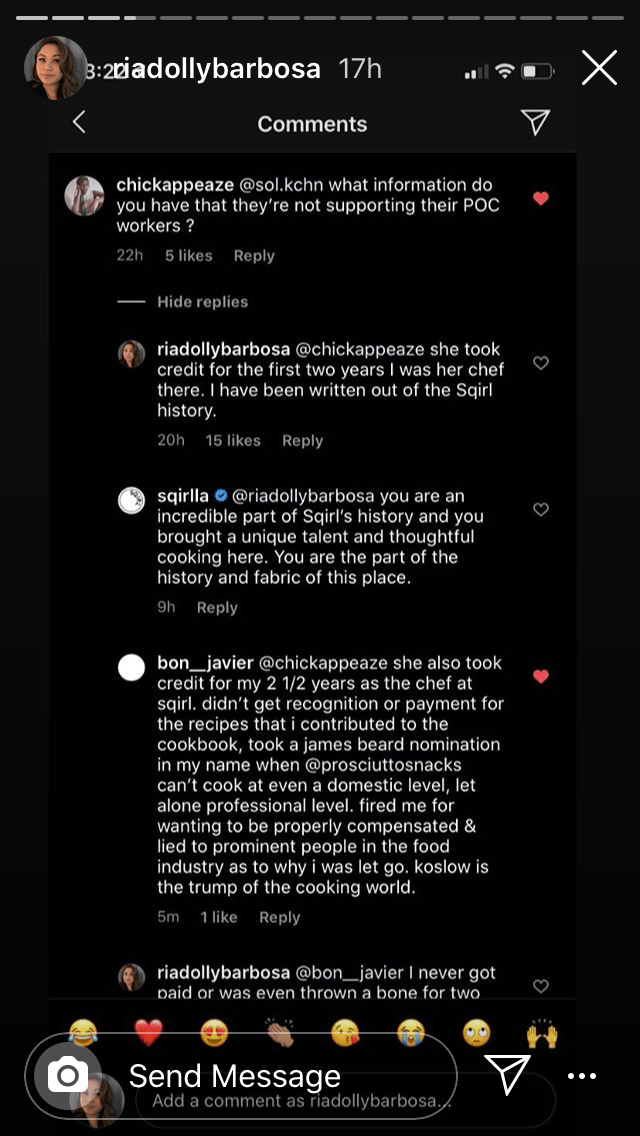
Ria Dolly Barbosa, another former Sqirl chef de cuisine, claimed that Koslow “took credit for the first two years I was her chef there,” adding, “I have been written out of Sqirl’s history.”
“I never got paid or was even thrown a bone for two specific recipes that were published in Bon Appetit and Food and Wine, let alone my contributions to the first cookbook that quite a few of my recipes are in,” she wrote on Instagram.
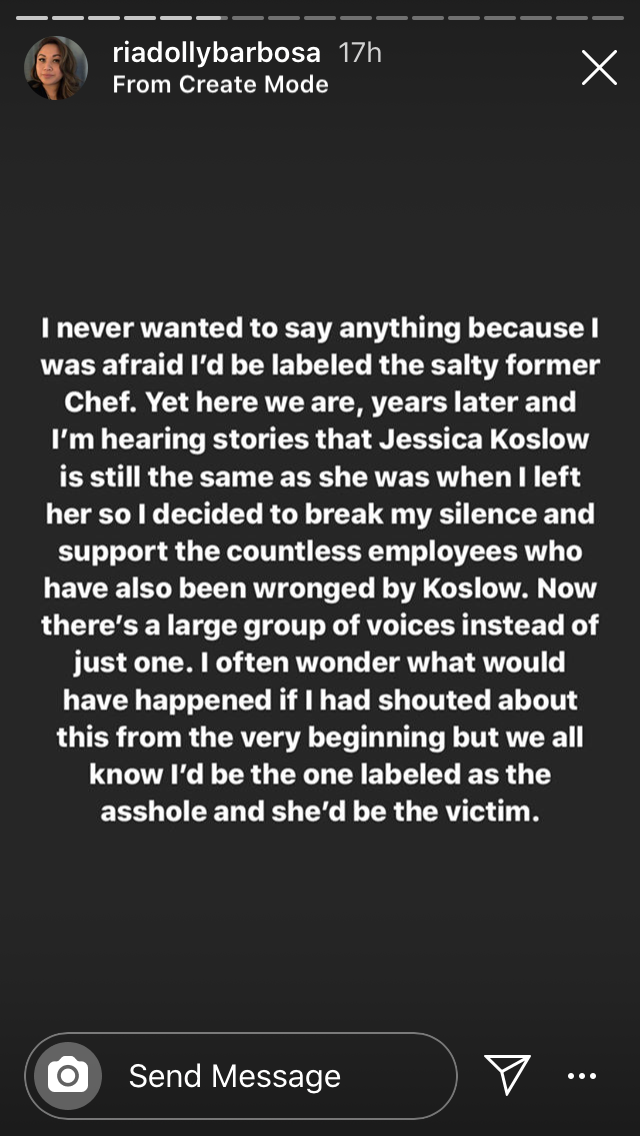
In response to these claims, Koslow sent a second statement to InsideHook on Tuesday evening, along with a Google Doc chronicling all the instances dating back to 2013 that Sqirl employees were credited or mentioned by name in articles about the restaurant, posts on the Sqirl website and posts by the restaurant’s Instagram account. (The doc makes no mention of Ramos and Barbosa’s cookbook recipes, or the Bon Appetit or Food and Wine recipes Barbosa claims to have not received credit for.)
“I have never claimed to be the creator and sole perfecter of Sqirl’s recipes, but I understand completely how it may look that way,” Koslow’s statement reads. “The truth is far more complicated and nuanced. Many recipes are original creations of our incredible cast of Chefs De Cuisine, Sous Chefs, and Pastry Chefs, (and me), while others are collaborations or iterations of another idea or inspiration. These individuals, in addition to the front-line, front of the house staff who make Sqirl a pleasant place to gather, are the bedrock of our success and why it has resonated with people. Since the beginning, I have attempted to acknowledge, both privately and publicly, individuals and their contributions to who and what are behind the reviews, loyal repeat customers and destination diners.”
Koslow cited a 2013 post on Sqirl’s website that she wrote in response to the restaurant’s four-star review in LA Weekly where she named individuals (including Barbosa Wilson) along with the specific dishes they created and “the personality and soul they gave to the place I started” and noted her practice of “recognizing our team publicly” on social media.
“We have worked to nominate our chefs for awards and recognition in an effort to help our cooks get wherever they want to go,” she wrote. “Could have I done more? Always. Am I so delusional to think that Sqirl’s success is all my own? Absolutely not. In fact, some of the very same people claiming they never received credit are prominently featured on our social media posts, in Sqirl’s cookbook and in awards they earned during their time here.”
That said, Koslow admits that “I am imperfect and I have made mistakes, and I am deeply sorry,” noting that she’s going to reevaluate how she credits chefs moving forward. “There is an existing structure in our industry for how restaurants retain the creative recipes and techniques that many chefs contribute to the place during their employment and I will consider my part in this system as we move forward,” she states. “I am profoundly grateful for their creations and talent and love that go into Sqirl’s menu and I can apologize for and fix my own mistakes, but I am not in a position, standing alone, to apologize for a business structure that is foundational to the entire service industry and the majority of American businesses.”
Ultimately, she says, “I want everyone who comes to eat at Sqirl to love it and everyone who works here to feel invested in, supported and seen. It hurts to think that some haven’t felt that way and it is my hope that our incredible management team and new processes can help with that as well.”
These are rough times for restaurant workers, many of whom have been out of work for months due to the pandemic, and Koslow says she doesn’t want customers to judge her employees for her mistakes. “I hope that people will not take out their disappointment with me on our staff and remember that these are incredible people that are working hard in an industry that has been decimated,” she says.
While the industry certainly has been decimated by the coronavirus quarantine, it’s also in the midst of a reckoning of sorts. The Sqirl allegations are just the latest in a growing number of instances of BIPOC chefs, food writers, etc. speaking out about their working conditions. Alison Roman’s controversial comments about Chrissy Teigen and Marie Kondo resulted in her being put on leave by the New York Times, but they also raised questions about appropriation, gentrification and authenticity. After editor-in-chief Adam Rapaport resigned after a photo of him in brownface surfaced online and BIPOC staffers claimed they were tokenized and not paid as much as their white colleagues, Bon Appétit was forced to pen “A Long Overdue Apology” to its readers. Above all, these episodes should serve as a reminder to us all to truly engage with the food we eat and praise — to think critically and educate ourselves about who made it, how they made it and where they made it, and to look beyond all the fancy toast pictures on social media.
This article was featured in the InsideHook LA newsletter. Sign up now for more from the Southland.


